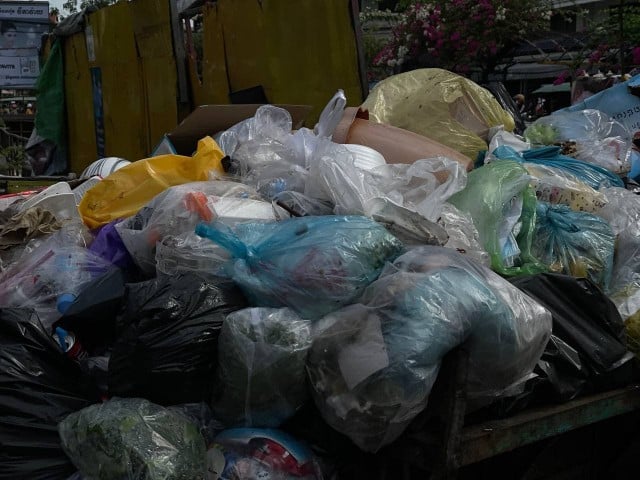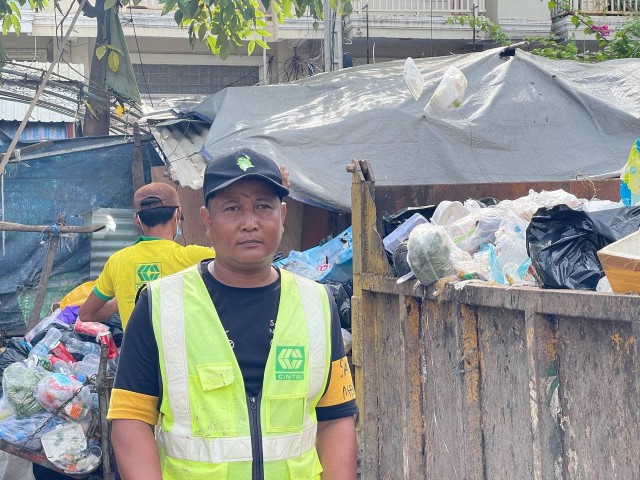Plastic Waste Surges Amid the Pandemic

- By Ou Sokmean
- and Sou Sokunthea
- August 12, 2021 7:38 PM
UN environment body calls for rethink
PHNOM PENH-- The Covid-19 pandemic has encouraged people to use more plastics, such as protective materials and food packages. The United Nations Environment Program, UNEP, says most of these plastics are used once then discarded to avoid the risk of virus transmission.
“The pandemic resulted in a staggering increase in the use of disposable plastic products such as masks and face shields, gloves, hand sanitizer bottles, protective medical suits, test kits, food take out containers, delivery packaging, and many other products that have become commonplace,” a UNEP report says.
Global sales of disposable facemasks may have reached an estimated US$166 billion in 2020, a 200-fold increase from 2019.
Sonali Dayaratne, UNDP acting resident representative, said UNDP has not conducted any research on the amount of plastic waste generated during the pandemic in Cambodia.
However, plastic consumption has increased significantly due to increased demand for food delivery and take-out packaging and for personal protective equipment (PPE) such as masks, and protective clothes and gear, she said.
Ov Sopheakrath has contributed to reducing plastics by replacing plastic bottles or cups with tumblers for drinks from shops. She also uses metal food containers to store her lunch or dinner. However, her plastic-free lifestyle has been disrupted since the February 20 Covid-19 community outbreak.
Plastic bags, plastic bottles, straws, foam boxes and masks are used and discarded by Sopheakrath no fewer than ten times a day. Her plastic consumption comes from buying packaged food at stores and ordering online goods.
“Every day, I find myself consuming more plastic because I no longer dine out for fear of contracting Covid-19,” Sopheakrath said.
“If I want to eat or drink from outside, I order online. The food, packaged in plastic, will be delivered to me. Every morning, I order a cup of coffee and bread, which comes in two plastic bags, one plastic cup, and with one plastic straw. By noon, I order lunch from stores, which also brings plastic. I consume a lot of plastic.”
Pon Chanboromey, a senior university student in Phnom Penh, also consumes more plastic than before. Boromey uses it once and throws it away. She has stopped eating at her favorite restaurants because of her fear of Covid-19.
“Before the Covid-19 pandemic, I could go to eat at the restaurants and use their plates, spoons, or glasses,” Boromey said. “But now that we are in the pandemic, I need to package food with plastics before bringing it home.”
The pandemic has changed the way people live, causing online delivery services to increase.
The owner of a rice and chicken porridge restaurant in Tuol Tom Poung market area, Hae Ky Gechchu, said most of her customers who used to eat in her restaurant have switched to take-out packaging, mostly plastic cups, foam boxes and plastic bags. She said consumption of all kinds of plastic in day-to-day life and business has increased amid the pandemic.
“If I can sell 50 bowls of rice or porridge a day, there will be about 30 to 35 bowls that are take-out packaging orders,” Gechchu said.
“Before, if the customers buy five boxes of rice or porridge, I can put them in one plastic bag together. But now, if the customers buy five boxes of rice, they ask me to put the boxes in five different plastic bags.”
On the streets, in public places and in restaurants in Phnom Penh, there is not much waste or garbage because people rarely eat there, said Chhun Savong, a trash collector at Cintri in Chamkarmon district. He said garbage at restaurant seems to be reduced but all kinds of plastic waste are noticeable at people’s homes.
“The amount of plastic waste in every citizen’s house is increasing,” Savong said. “Most of that plastic waste is foam boxes, plastic cups, plastic bags and so on.”

Un Panha, chief of Cintri’s cleaning and garbage collection workers, said since the February 10 event, general garbage in Chamkarmon and Boeung Keng Kang districts has halved, from 400 tonnes to 200 tonnes. However, plastic waste has drastically increased.
“Every day, foam litter, plastic bags, and plastic cups are commonly found in every household,” Panha said. “Due to the Covid-19 outbreak, both sellers and buyers use a lot of plastic packaging. Therefore, plastic waste has increased a lot.”
Reducing in-store consumption by moving to take-out package services is a good choice during the pandemic. However, the use of plastic bags, straws, plastic cups and foam boxes is threatening the environment.
The biggest problem with plastics is that they take a long time to decompose, while some can take thousands of years to disappear, the Environment Ministry says.
These plastics do not dissolve. They just break down into smaller pieces of plastic, which pose a risk by releasing toxic chemicals when disintegrating. The toxic chemicals pollute the environment, kill animals and harm human health.
Ministry spokesman Neth Pheaktra said residents in Phnom Penh generate 2,700 to 3,000 tonnes of trash every year, of which more than 20 percent is plastic waste.
No specific report had been released, but Pheaktra said he has estimated that plastics consumption could be exacerbated by Covid-19 due to the heavy consumption by citizens to prevent Covid-19 infection and transmission.
“In Phnom Penh, according to a previous study, more than 10 million plastic bags are used every day” he said. “This number may increase further with the use of Covid-19 protective clothing of frontline workers against the disease.”
To reduce plastic consumption and waste production, Pheaktra encourages people to follow the 4Rs+1 strategy.
The strategy includes 1) Refuse to use all disposable plastics, such as straws, cups, bags, bottles, foam boxes and food containers. 2) Reduce plastic consumption by using environmentally friendly materials. 3) Reuse old plastics instead of buying new ones. 4) Recycle and dispose of plastics responsibly. 5) Remind others of the significance to follow the 4Rs strategy and take action to reduce plastics.
Pheaktra said the Capital-Provincial Administration has divided waste according to each category, such as plastic, organic, and hazardous or chemical waste, to properly manage waste during the pandemic.
Cambodia produces more than 10,000 tonnes of trash per day and more than 4 million tonnes a year. Of this, 68 percent is organic, 20 percent is plastic and more than 10 percent is solid or hazardous waste, according to a ministry report in 2019.
The major capitals and provinces that generate large amounts of litter include Phnom Penh, Sihanoukville and Siem Reap. Phnom Penh produces about 3,000 tonnes of trash per day, of which 20 percent is plastic. Sihanoukville produces about 700 tonnes daily while Siem Reap produces about 400 tonnes.
UNDP acting resident representative Sonali urged the government to enforce existing and new regulations to reduce the use of single-use plastic and promote segregation of waste and recycling.
She called for a provision of technical and financial support for plastic alternatives and recycling businesses and for mobilization of the private sector, youth, and local communities to tackle plastic pollution.
Additional reporting by Teng Yalirozy















